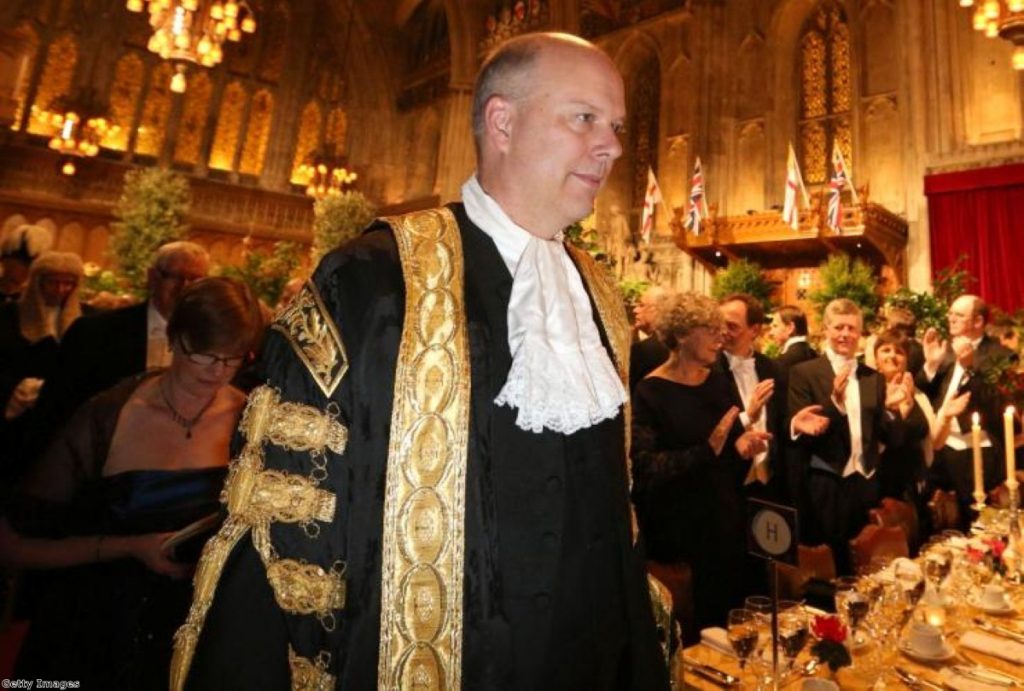Judicial review: Parliament unites against Grayling’s assault on justice
Government proposals making it much harder for ministers to be challenged in the courts have been slammed in a report by parliamentarians.
A report by the joint committee on human rights extended the criticisms already voiced by MPs to Chris Grayling, the justice secretary behind the reforms.
Grayling combines that role with his title of lord chancellor, a position which has for centuries defended the judiciary.
Now MPs and peers have declared a "thoroughgoing review" of the dual role is needed because, they suggest, Grayling's moves to undermine the rule of law are politically motivated.


"There needs to be a complete review of the implications of combining in one person these roles, and of the current structure of departmental responsibilities between the Home Office and the Ministry of Justice," committee chair Hywel Francis said.
MPs and peers dismissed the government's rationale for stripping back the ability of individuals and organisations to challenge the executive in the courts via judicial review.
Ministers had argued a rapid growth in the number of cases in recent years meant the brakes had to be applied to the process.
But today's report has pointed out the increase is primarily due to a significant jump in the number of immigration cases.
These are now being dealt with outside that system, meaning the government's principal reason for reform no longer exists.
Today's report calls on the government to adopt an alternative set of reforms put forward by the Bingham Centre on streamlining judicial review.
This would reduce unnecessary cost and delay and "make the process of judicial review more expeditious and therefore cheaper without compromising effective access to justice", MPs and peers said.
Their report strips apart the government's arguments proposals.
It confirms the government's proposals to force judges to disregard judicial review applications where the procedural issue being challenged would not ultimately have made a difference "gives rise to the risk of unlawful administrative action going unremedied".
It says ministers' proposal to only make legal aid payable if permission for the judicial review is granted is "a potentially serious interference with access to justice".
And it warns the move to allow legal costs to drastically increase in many cases "is too great a restriction and will undermine effective access to justice".
The reforms to judicial review are having a prolonged gestation as the legislation is unlikely to be completed before the current session of parliament ends.
A debate is expected before then on the floor of the Commons as the bill must complete its stages in the lower chamber before the next Queen's Speech, however, when Labour is expected to renew its attacks on the proposals by citing today's report.
"This is a devastating critique of the failure to grasp the complexity of the conflict of interest inherent in the dual role of politician and legal champion," said Frances Crook, chief executive of the Howard League for Penal Reform.
"Unfortunately the error has been to concentrate on the politics while the rule of law has suffered."
The Ministry of Justice issued a defiant response, however.
A spokesperson said: "We want to make sure judicial review continues its crucial role in holding authorities and others to account, but also that it is used for the right reasons and is not abused by people to cause delays or to generate publicity for themselves or their organisations at the expense of ordinary taxpayers.
"Our reforms will bring balance to the judicial review system so justice is done, but unmerited, costly and time-wasting applications no longer stifle progress."
Writing for Politics.co.uk, shadow justice minister Andy Slaughter said Grayling was effectively making it all but impossible for anyone except the very rich to pursue judicial review cases in the future.
"Grayling is planning a big party next year to celebrate the 800th anniversary of Magna Carta," he wrote.
"He fails to see the irony that he, the first non-lawyer to hold the post of lord chancellor in over 300 years, is undermining its greatest legacies, establishing the rule of law and protecting the citizen from the uncontrolled power of the state."

